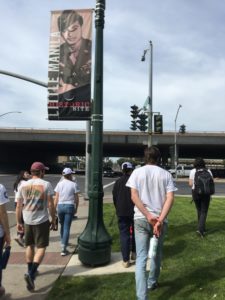March Great Story by Gillian Greenberg, 2017-18 Central Inland Climate Fellow
Growing up, Cesar Chavez rarely made the list of important figures in American history classes. I had never spent any significant amount of time learning about him and the labor movement he led until March regional training. As we watched a video about his activism and made mind maps to organize our thoughts, I was struck by how resonant this history felt to our current political moment. I struggle putting words to the experience but something felt so necessary about taking the time to learn this history in preparation for our service day. It provided some context for the agricultural history of the Central Valley and satisfied my intellectual desire to examine the life of a place before leaving my own mark.
The service day itself continued to delve deeper into the labor and cultural history of California agriculture with a focus on the inequities in Central Valley communities. Our service at Boggs Tract Community Farm provided an opportunity to examine the unequal access to opportunity in present day Stockton as the farm aims to foster local food production in a neighborhood surrounded by industrial land uses and plagued with contaminated soil. As Javier, our staff guide for the day, mentioned in his concluding remarks, this farm is one product of the legacy of Cesar Chavez as residents explore small scale production in community in contrast to industrial scale, impersonal agriculture.
The second portion of the day spent learning about the Filipino American community in Stockton offered a different perspective on the agricultural history of the mid-twentieth century and the treatment of working class communities. Despite the integral role Filipino farm workers played in the labor strikes of the 1960s, I had never heard specifically about a Filipino population in California. As Dillon explained the culture of the Filipino community in Stockton, it became increasingly clear that the Filipino legacy had almost been lost. The gas stations and empty buildings on the blocks that used to be Little Manila exemplify the place’s loss of its Filipino identity. Recovering that history through storytelling, historical banners, and preservation of artifacts felt like a small step towards finding a place for Filipino contributions in our historical understanding of the labor movements we celebrate on Cesar Chavez Day.




